Management theorist Carol Sanford — author of The Regenerative Business, The Regenerative Life, and No More Feedback — provides a clear blueprint for developing intellectual self-reliance.

Believe In Yourself
Veteran management theorist Carol Sanford — author of The Regenerative Business, The Regenerative Life, Indirect Work, and No More Feedback — offers practical guidance to help you become your own primary source of knowledge and judgment.
Theories of Knowledge
Behaviorism — a 20th-century school of psychological thought — held that external rewards and punishment condition people to behave predictably and controllably. Behaviorists saw their role as managing the external conditions that determine behavior to produce a well-organized society.
We face a crisis of mental dependency at a historic moment when the need for independent thought and innovation has never been greater.
Carol Sanford
Behaviorism dismissed inner reflection. Over time, Sanford writes, behaviorism’s influence spread to the military, education, and parenting.People’s introspective capacity weakened, and they grew dependent on external authorities to manage their thoughts and actions.
Today, the dominant epistemology is the external-authority theory of knowledge based on materialistic science. This theory assumes people can measure, know, and manage the world. Therefore, all knowledge comes from credentialed experts who serve as the sole sources of truth. People wrongly focus on finding external validation, conforming to norms, and seeking dominance over others.
Sanford argues that people must rebuild their capacity for independent thought and self-management. The self-determination theory of knowledge assumes people develop knowledge by examining the sources of their thoughts and beliefs. This theory eschews authorities’ and experts’ opinions in favor of independent, questioning thought.
The way we think about what is knowable and true determines everything else that we experience.
Carol Sanford
In the 1990s, as South Africa dismantled the apartheid system, Sanford led Colgate South Africa to become a model for developing Black leaders and empowering Black workers. Colgate South Africa became a top-performing division in the corporation’s global operations. Sanford worked to build the creativity, intelligence, agency, and conscience of the people involved.
Sanford’s empowering approach prompted company employees to expand their capabilities to serve their chosen path. They learned to think independently. Sanford vested in living systems frameworks, which view systems as networks of living things functioning within nested systems of other living things — in contrast to the standard modern understanding of organisms, societies, and economies as machines.
Independent thinking liberates intelligence and drives innovation. Although business was crucial in spreading behaviorist ideas in the 20th century, it can now nourish a new, more productive, independent, and sustainable paradigm.
A “Sourcing Mind”
A sourcing mind means examining the sources and integrity of your thoughts, opinions, and beliefs. Challenge your mental conditioning and deepen your understanding of everything you learn to contribute to your development. A person with a sourcing mind questions authority and frames the world — and their thoughts and beliefs — through their own specific experiences.
To help others develop a sourcing mind, Sanford recommends the “fishbowl” method: Two people agree to a dialogue in a group setting. Person One allows Person Two to ask questions challenging a particular belief Person One holds. While these two examine their beliefs aloud, audience members self-examine their beliefs about the topic via the same questions and frameworks.
When self-determination theory replaces the external-authority epistemology, the goal shifts from the dominance of others to the development of intelligence — specifically, systems intelligence, the understanding of the living systems around you. This understanding enables you to participate in the evolution of these living systems.
To develop your own systems intelligence, question the structures in your world, including physical structures, such as the design of city streets; processes, such as how people organize specific tasks; and beliefs, such as that the best way to organize people is in a hierarchy. Make your thinking concrete and specific, Sanford states. Avoid the abstract and generic. Instead of lumping people into categories and types, deal with each person as a unique and alive individual. Learn to trust your lived experience and apply careful examination and reflection to your decision-making.
Evolutionary Contributions
Humans are uniquely capable of time-binding — a concept originating with the semanticist Alfred Korzybski. While animals bind space by manipulating and combining physical materials, and plants bind energies via processes such as photosynthesis, humans alone bind time by manipulating ideas and insights via stories, dances, writing, and mathematics. Humans can accumulate complex understandings and pass them down through generations. This process allows humanity to become wiser across long periods of time — to, in other words, evolve.
Let this multigenerational attempt to deepen human wisdom and contribute that wisdom to the evolution of living systems guide you, Sanford writes. Engage in practices such as never doing anything the same way twice. Let new ideas emerge from the people, places, and processes these ideas affect. Don’t separate learning from doing; combine them into a seamless whole. Training programs and actual projects should entwine to expand people’s capabilities at work.
People become wise…by faithfully surrendering themselves to the lifelong exploration of a profound question.
Carol Sanford
Cultures with strong oral traditions use dialogue to bring new perspectives to old ideas and to arrive at shared understandings. Practice this at work by asking others to form their thoughts about a new subject before you share yours. Limit the use of written material to circumvent reliance on outside experts.
Before adopting others’ ideas, test them. Experience the meaning and implications of the ideas and examine their source premises, frameworks, and paradigms.
Self-Reliance
Carol Sanford advocates for an ancient method of approaching the world: self-reliance. She urges you to stop over-relying on experts and so-called authorities to guide your thoughts and actions and find your own path by carefully and skeptically considering what you believe and why. Sanford seeks to inspire, and she succeeds. She is not a table-pounding orator; she argues with cool, clear common sense and dynamic articulation. While this may be more of an eye-opening text for pre-college readers, Sanford’s insights and methods for changing your perspective will resonate with all individuals looking to reshape their lives.







